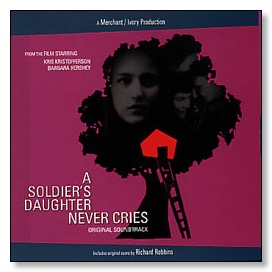Paul Francis Fortescue (A Soldier's Daughter Never Cries)
18/06/11 14:14

A Soldier's daughter never cries
(….)
Voor het tweede deel, Francis, nemen we een klein sprongetje en zijn de kinderen ondertussen als 15 jaar. Billy is nog steeds zwijgzaam en blijkt zich niet echt te kunnen aanpassen aan zijn omgeving. Channe daarentegen gaat een hechte vriendschap aan met Francis Fortesque. Francis is anders als de andere jongens. Hij geeft zich helemaal over aan de opera en is stiekem verliefd op Channe.
(….)
Sven van Beir
A Soldier's daughter never cries

MOVIE REVIEW FROM THE NEWS JOURNAL
|
|
Growing up with James Jones
|
Novelist's daughter actionalizes her expatriate childhood(R)
|
By MARSHALL FINE
Gannett Suburban Newspapers
|
"A Soldier's Daughter Never Cries" stands somewhere in the middle of the abundance of films this fall about families, as told from the children's point of view.
|
Directed by James Ivory and adapted from a novel by Kaylie Jones, "Soldier's Daughter" is a loosely fictionalized version of Jones' life. The daughter of novelist James Jones, she used the book to look back at the life of her family in the 1960s and early 1970s, when they lived in Paris.
|
The fictional version of Jones is Bill Willis (Kris Kristofferson), an expatriate American writer in France, where he lives with his wife, Marcella (Barbara Hershey) and daughter Channe (Leelee Sobieski). The story is broken into thirds, each covering a few years of the Willis family life.
|
The first section deals with the family's adoption of a little boy named Benoit (Samuel Gruen), the son of a French teen who has put him out to foster care for the first seven years of his life. The Willises' attempt to adopt him is complicated by the mother's refusal to sign the final papers, out of some lingering sense of regret.
|
Benoit at first regards the Willis household as one more tentative stop. He drags around his packed suitcase, assuming that he eventually will be forced to move again, as he so often has in the past.
|
He and the maturing Channe initially are at odds. But they begin to develop an empathy and friendship that turns into full-blown sibling acceptance, even as Benoit announces that he wants to assume an American name: Billy.
|
The film jumps ahead a few years: Billy, now speaking flawless English, has grown into a teen (Jesse Bradford). And Channe has been befriended by a new boy at the American school she attends in Paris:
Francis Fortescue
(Anthony Roth Costanzo). Francis and Channe hit it off because Channe enjoys Francis' eccentricity: his love of opera, his outlandish clothing, his ability to sing soprano arias.
|
But the behavior of the effeminate Francis, who has made himself an outsider at school, begins to wear thin when Channe starts to develop an interest in the opposite sex. She wants to fit in and be accepted; Francis, knowing he never will, begins to act out his anger against her.
|
Their inconclusive relationship comes to an abrupt end when Bill announces that he is moving the family back to the United States. His congenital heart problem is worsening; he wants to be in the care of American doctors when his health begins to fail.
|
They move to Long Island, where Channe and Billy are outsiders because of their French childhood. Billy becomes a TV-watching recluse; Channe, to gain acceptance, begins having sex with a variety of boys in the back seats of cars.
|
Crisp and succinct in its storytelling, this film focuses on the changing dynamics of a single family -- both as Americans abroad and as parents and teens coping with the shifts that puberty and aging bring. Ivory tells this elliptical story as well as possible, given the sketchy script he co-wrote with Ruth Prawer Jhabvala.
|
But that sketchiness is a problem. Too much of the film centers on Channe, who is portrayed with little color by Sobieski, a bland presence who can't even summon a decent dose of teen petulance.
|
By contrast, Kristofferson, as the rugged and gruffly loving Willis, brings a gravity and humor to an underwritten role. He makes a strong counterpoint to Hershey, as the flamboyant Marcella, who dresses like a vamp and isn't afraid to go toe-to-toe with her kids' French teachers.
|
In the end, however, "A Soldier's Daughter Never Cries" seems like one of those lengthy family stories that are only of interest to other members of the family.
|
t to other members of the family.
|
A Soldier's daughter never cries

|
| Drama | 1998
Though the title reeks of melodrama, don't go into A Soldier's Daughter Never Cries expecting a three-hankie tearjerker. After all, this is the world of Merchant Ivory, the producer-director team who gave us A Room With A View, Howard's End, and The Remains of the Day—you know, meticulous period detail and complex, nuanced characters. Their latest literary adaptation is based on the 1990 novel of the same name by Kaylie Jones (daughter of World War II novelist James Jones who wrote From Here to Eternity and The Thin Red Line), which is based in part on her own childhood in the '60s and '70s. There's not a corset in sight; A Soldier's Daughter is filled with halter tops and bellbottoms.
The film charts the childhood of young Channe Willis (Leelee Sobieski), who grows up with her expatriate family in Paris and experiences major cultural upheaval when they return to Long Island, N.Y., just as she's reaching puberty. Richly textured and subtly played, the film has the melodic complexity of a Serge Gainsbourg album (in fact, the French jazz composer's presence is keenly felt in the casting of his former collaborator, singer-actress Jane Birkin, as a flaky free-spirit).
In Paris, Channe lives in a bubble of half-assimilation. By night, her parents—gruff, but tender Bill (Kris Kristofferson) and effervescent Marcella (Barbara Hershey)—hold chic Yankee cocktail parties in their spacious apartment; and by day, Channe attends an English-speaking lycee. Even her adopted brother, Benoit (Jesse Bradford), prefers to be called Billy. Channe's closest friends are Candida (Dominique Blanc), the family's fiercely loyal Portuguese maid, and Francis Fortescue (played by teen opera star Anthony Roth Costanzo), her gloriously foppish classmate who's ostracized by the rest of the school. Once back in the States, Channe finds herself an outsider, sexing boys in the backseats of their cars because she can't make real friends. As lost in America as the rest of her family, she must come to terms with both her cultural and her personal identity as her beloved father becomes seriously ill.
In her first lead role, Leelee Sobieski (who appeared in Deep Impact and co-stars in Stanley Kubrick's upcoming Eyes Wide Shut) is a total natural—she looks like a young Helen Hunt and has a similar knack for underplaying. She's affecting because she's as truthful as the film, which never telegraphs its big emotional moments. Kris Kristofferson is all bluster and heart as the proud papa; his Bill Willis is kind of a cussing Atticus Finch. Similarly, Barbara Hershey projects warmth and vitality as Channe's fun-loving mother. And though he's only in the film's first half, Anthony Roth Costanzo is divine as a flamboyant adolescent too ahead of his time to overcome his self-hatred.
A Soldier's Daughter Never Cries is destined to appeal largely to art-house crowds. Its elliptical narrative structure eludes the sappy but popular cliches that plague most coming-of-age flicks and period family epics. (It's considerably less heavy-handed and kitschy than Ang Lee's The Ice Storm, but just as rarefied in its appeal.) The film does have its flaws. Some subplots are left dangling and audiences may find it too austere for its own good. But to the credit of Merchant and Ivory, their latest, more contemporary endeavor is also their best picture in a long time (remember Jefferson In Paris or Surviving Picasso?). A Soldier's Daughter is one of the best mosaics of family life on-screen we're likely to see because it's populated by kind, good-hearted characters who are somehow never less than thoroughly intriguing.
--Kevin Maynard
'Daughter' a Sensitive Look at Love, Acceptance
KENNETH TURAN TIMES FILM CRITIC
Friday September 18, 1998
(…)
The first of those is called "Francis," after Paul Francis Fortescue (beautifully played by Anthony Roth Costanza), a flamboyant young man whose close teenage friendship with Channe is threatened when she starts to take a romantic interest in other boys. Again, the awkwardness and entanglements of those years is tricky material to handle well, but Ivory, who's said that in creating this character "I sometimes drew on myself," knows how to make it valid.
(…)
|
|
|

The story begins by portraying Willis and his wife Marcella (Barbara Hershey, as always without vanity), as boozy American expatriates in 1960s Paris. The family's life is shown mostly from the perspective of young Channe (Leelee Sobieski), who is becoming a writer herself. She is befriended by a schoolmate in Paris, a stranger who opens a magnificent, exotic, different world, the self-dramatizing and sexually ambiguous Francis Fortescue (the frighteningly poised Anthony Roth Costanzo), whom Ivory has said he let take over the narrative, identifying with "the clever sissy who knew from the first grade he would take up a 'life of art.'"



![]()


